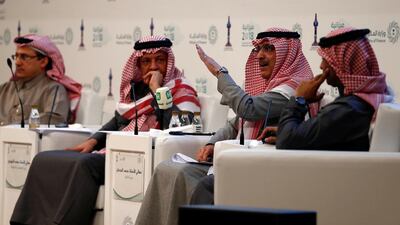For investors who watched austerity measures pummel growth over the past two years, Saudi Arabia’s 2018 budget is a relief.
The world’s biggest crude exporter will boost spending to 1.1 trillion Saudi riyals (Dh1.07tn) to revive an economy that has languished as the nation copes with low oil prices. Ashmore Group says it is a sign crown prince Mohammed bin Salman’s reforms are going ahead, and markets will probably rally, according to Arqaam Capital.
The spending plan “is enough to surprise the market, definitely,” said Jaap Meijer, the head of equity research at Arqaam Capital in Dubai. “Oil prices are up, which means there is fiscal space to support non-oil gross domestic product. That’s pretty relevant given the anti-corruption drive, which could have ramifications for GDP growth.”
The kingdom has gradually relaxed restrictions for foreign stock investors as part of Prince Mohammed’s plan to overhaul the economy. But cuts to bonuses and subsidies over the past two years have weighed on investors, as have the arrests of high-profile Saudi businessmen and princes and the nation’s ongoing spat with Qatar.
The Tadawul All Share Index has missed out on a rally that put emerging-market stocks on course for their best year since 2009, and the share of total foreign ownership of the nation’s stocks has lingered below 5 per cent since the kingdom first allowed overseas investors to trade Saudi shares directly in 2015. Meanwhile, Saudi individuals have been net sellers of stocks every week since April 2016.
___________
Read more:
Saudi Arabia budget shows government’s optimistic outlook
Saudi Arabia's budget deficit narrows to 8.9% for 2017
___________
Even so, “the gradual rolling back of the state and the liberalisation of prices are good things,” said London-based Jan Dehn, the head of research at Ashmore Group, which holds US$65 billion of emerging-market assets, including Saudi dollar debt. “We’re looking at a country that seems to be opening up more and more for investors and liberalising.”
The economy will expand 2.7 per cent, after contracting 0.5 per cent this year, while inflation will accelerate to 5.7 per cent from negative territory as of the end of 2017, according to government forecasts. The kingdom delayed a goal for achieving fiscal balance to 2023 from an initial target of 2019.
“The Saudi budget story is one of balancing fiscal consolidation with the need for reviving growth,” said Karachi-based Bilal Khan, a senior economist for the Middle East, North Africa and Pakistan at Standard Chartered.
“Although the spending increase itself may not appear large, on balance, a slower pace of deficit reduction is positive for the 2018 economic outlook.”

